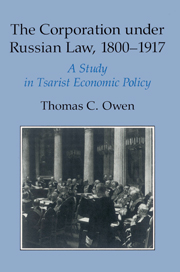Book contents
- Frontmatter
- Contents
- List of tables
- Preface
- Abbreviations
- The corporation under Russian law, 1800–1917
- 1 Zakon (The law), 1800–1856
- 2 Birzhevaia goriachka (Stock-exchange fever), 1856–1870
- 3 Proval reformy (The failure of reform), 1860–1874
- 4 Opeka (Tutelage), 1865–1890
- 5 Proizvol (Arbitrary acts), 1880–1905
- 6 Bezobrazie (Outrage), 1905–1914
- 7 Tupik (Dead end), 1914–1917
- 8 Autocracy, corporate law, and the dilemma of cultural delay
- Selected bibliography
- Index
- Studies of the Harriman Institute
2 - Birzhevaia goriachka (Stock-exchange fever), 1856–1870
Published online by Cambridge University Press: 22 September 2009
- Frontmatter
- Contents
- List of tables
- Preface
- Abbreviations
- The corporation under Russian law, 1800–1917
- 1 Zakon (The law), 1800–1856
- 2 Birzhevaia goriachka (Stock-exchange fever), 1856–1870
- 3 Proval reformy (The failure of reform), 1860–1874
- 4 Opeka (Tutelage), 1865–1890
- 5 Proizvol (Arbitrary acts), 1880–1905
- 6 Bezobrazie (Outrage), 1905–1914
- 7 Tupik (Dead end), 1914–1917
- 8 Autocracy, corporate law, and the dilemma of cultural delay
- Selected bibliography
- Index
- Studies of the Harriman Institute
Summary
The whole system [of merchant taxation in Russia] seems most elaborately devised to destroy all enterprise, and to depress as much as possible the spirit of trade, in a country which naturally possesses it in but a very limited degree; and it must be long ere the resources of the country can be properly developed while the government seeks its own aggrandisement regardless of the prosperity of the community, since the protection it affords to home manufactures, by the duty on foreign goods, is effectually neutralized by the expenses attendant upon the sale and manufacture of the home product itself.
– Laurence Oliphant, traveler (1852)Having surveyed the intentions of the tsarist policy makers, we must now shift the focus of our discussion from the law itself to the object of the law: corporations and their managers. The efforts of Finance Minister Reutern and his successors to reform the corporate law of 1836 can be understood only in the context of the persistent abuses that marred the corporate economy in the early decades of the reign of Alexander II. It is, of course, impossible to review all aspects of economic development in this period, but several episodes well illuminated in the memoir literature and other primary sources may be cited to show the interplay between the law and trends in corporate development.
- Type
- Chapter
- Information
- The Corporation under Russian Law, 1800–1917A Study in Tsarist Economic Policy, pp. 30 - 54Publisher: Cambridge University PressPrint publication year: 1991



